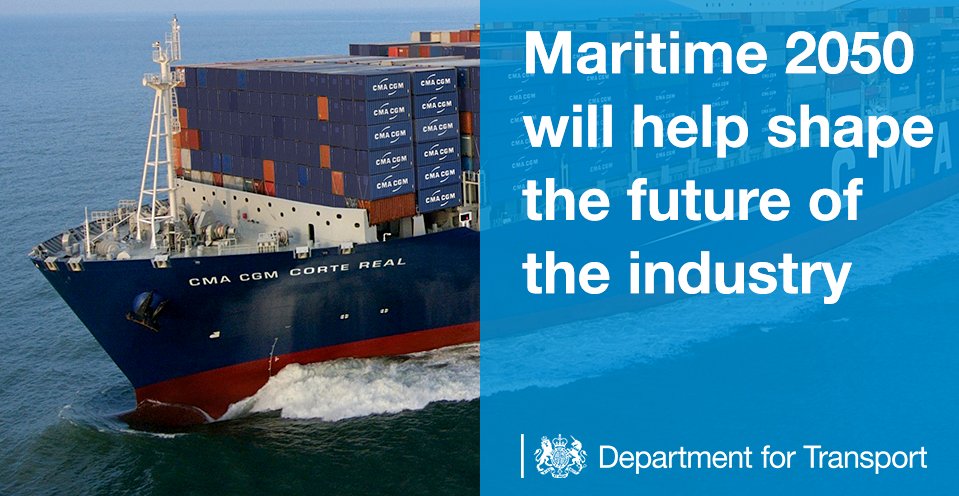

Chris
Grayling and Nus Ghani
<<<< SECTION 2 - OUR APPROACH
SECTION 3 - ECONOMICS
The Role of Targets
59. The Government’s Maritime 2050 Strategy contained the following commitments:
● Government will consider the merits of introducing a medium-term target
for emissions of GHGs and air quality pollutants from UK shipping. Further
detail on this consideration will be set out in the Clean Maritime Plan.
● Government will consider the
introduction of a target to reduce emissions of GHGs and air quality pollutants from UK shipping
towards zero. Further details on the government’s long-term plans to reduce emissions
from UK shipping, will be set out in the Clean Maritime Plan, taking into account
the IMO’s 2050 GHG target.
●● Government will work to ensure
maritime greenhouse gas emissions are appropriately taken into account in national and
international emission reporting. The government will carefully consider the CCC’s advice on the
inclusion of international shipping within carbon budgets. Further information on
the Government’s plans will be set out in the Clean Maritime Plan.
60. UK domestic policy relating to emissions of GHGs from the maritime sector is based
around the Climate Change Act 2008, which requires that the UK contributes to
global emission reductions by reducing UK GHG emissions by at least 80% of 1990
levels by 2050. In order to meet this target, the Government has set five-yearly carbon
budgets which currently run until 2032. These restrict the amount of GHGs the UK can legally emit in a five-year period.
61. At present, emissions from domestic shipping are included in both the existing carbon budgets and current 2050 target.
Although emissions from international shipping are not currently included in the UK’s targets under the Climate Change Act, our carbon budgets put the UK on
a trajectory consistent with a 2050 target which includes these emissions.
62. On 2 May 2019, the Committee on Climate Change published its report ‘Net Zero: The UK’s Contribution to Stopping Global Warming’. This recommended that the UK should legislate as soon as possible to reach net-zero greenhouse gas emissions by 2050. The Committee also advised that
this revised target should cover all sectors of the economy, including international shipping.
63. In June 2019, the UK became the first major economy to legislate for net zero
emissions, setting a target for 2050. Although emissions from international
shipping and aviation are not formally included within the legislation at this point,
it is essential that these sectors play their role. To ensure we are on the right
trajectory for net zero emissions across the economy, we will continue to
leave ‘headroom’ for international shipping and aviation emissions in our carbon budgets.
Since the 1997 Kyoto Agreement on climate change, international shipping and
aviation emissions have been dealt with via the IMO and ICAO respectively. This is
important given the global nature of these industries. Government continues to be
of the view that action to tackle emissions from these sectors must be done globally
to be effective. The UK will continue to take a leadership role at the IMO, pushing for
the most ambitious measures to deliver the vision, and emission reduction targets,
of the IMO GHG Strategy. The UK will continue to advocate strongly at the IMO
for the most ambitious measures to deliver the vision, and emission reduction targets,
of the IMO GHG Strategy. Government will keep our approach to the inclusion
of international shipping and aviation emissions in our legislation under review,
taking account of progress in the IMO and ICAO.
64. In relation to regulations for domestic shipping, following publication of Maritime 2050, Government has commissioned research which indicates that the introduction of targets for maritime emissions can act as a useful signal of the direction of emissions
policy [56]. As well as raising public awareness, this research identified that targets can provide
additional certainty to firms (both in the maritime sector and related sectors) to inform their investment decisions, and contribute to addressing the barriers to reducing shipping emissions, such as “by encouraging owners to take a longer-term view of their assets and investments”.
65. The extent to which targets may bind market participants depends on the regulations which underpin them. However, it is clear that targets are necessary in order to support an effective domestic regulatory environment. Following stakeholder feedback during the development of the
Clean Maritime Plan, it was established that further consultation would be required to
determine the exact nature of any binding target. The section below on the role of
economic instruments sets out how such consultation may be taken forward.
66. In the absence of any mandatory targets, however, consultation to-date has indicated that the market may benefit from further policy certainty regarding the future fuel and technology mix required in a zero-emission world.
67. To assist in providing some clarity, the Government has commissioned
research [57] to investigate the likely take-up of technologies and alternative fuels, and
the associated costs, under a number of different future scenarios. This research
does not represent policy decisions. It seeks only to identify possible future
technology mixes in different scenarios under changing assumptions about policy
and the availability of alternative fuels. Nevertheless, certain conclusions can be
drawn from this research. In particular:
● Certain categories of vessel traffic are
estimated to be particularly significant contributors to UK shipping emissions.
For example, container vessel traffic is estimated to make the highest contribution to UK international shipping
GHG emissions, while ro-ro vessel traffic is estimated to be the highest
contributor to UK domestic shipping GHG emissions.
● In order to achieve the reductions
in GHGs required by the IMO GHG Strategy, it is estimated that energy efficiency improvements
alone will not be sufficient and that the use of alternative fuels (such as hydrogen, ammonia or
methanol) will be required.
● Under the assumptions made in the
research, ammonia is estimated to be more cost-effective than methanol or
hydrogen for most ship types. However, there is substantial uncertainty around
this result, so it is not possible to reach definitive conclusions on this at
present. In addition, under these assumptions, generation of hydrogen, methanol and
ammonia is estimated to be more cost effective using fossil fuels (with carbon
capture and storage) rather than via electrolysis
[58].
● LNG is not estimated to be a substantial
part of the fuel mix in the future (whether near future, around 2035, or longer-term,
around 2050) under any scenarios that achieve the reductions in GHGs required
by the IMO GHG Strategy
● Electricity is estimated to play a much
smaller role than that of alternative fuels, with electric propulsion take up limited
to vessels that operate short voyages, such as short ferry crossings. Whilst its
use is expected to be more significant for the UK domestic fleet than the UK
international fleet, it is still estimated to remain relatively small under all
scenarios. This conclusion is sensitive, however, to current cost assumptions,
such as regarding the capital cost of batteries.
● Whether or not shipping has access
to biofuels is not estimated to result in a significant difference in the costs
to business of delivering the reduction in GHGs required by the IMO GHG
Strategy.
68. This last point is relevant given the need to ensure, across the economy, the optimal
use of limited feedstocks of sustainable bioenergy supply. The most recent advice from Government’s independent advisory body, the Committee on Climate Change, suggests that the use of biofuels should be directed towards those sectors which faces the hardest challenges to abate
emissions [59]. The extent to which biofuels may play a role in decarbonising the maritime sector will need to be considered carefully against the needs of these other sectors (such as aviation and heavy goods vehicles) to ensure cost-effective decarbonisation for the whole economy.
69. There are also important considerations regarding hydrogen, ammonia and
methanol as alternative fuels. Since none of these fuels are currently widely used for
marine propulsion, their uptake will require the development of both safety standards
and bunkering infrastructure. It should be
noted, however, that the maritime sector already has significant experience working
with each of these products, which are already shipped as cargo on a significant
global scale60 (18.8 million tonnes of ammonia was exported between 2015
and 2017, for use in the fertiliser industry, for instance [61]). As such, there already
exists global infrastructure and established standards for their handling, storage and
transport in bulk form.
70. The adoption of bioenergy or alternative fuels would also need to be done so as
to take account of potential air pollution impacts. Ammonia, in particular, is itself
an air pollutant, primarily emitted from the agricultural sector during the storage and
spreading of manures and slurries, as well as the application of inorganic
fertilisers [62]. The Government has adopted a legally binding international emission reduction
target for ammonia. Unintentional releases of ammonia (through leaks or unburnt fuel)
would need to be managed, as would the NOx emissions generated by combustion.
The latter could be managed using SCR technologies, which are already applied
to marine engines in order to comply with
IMO Tier III requirements in designated NOx Emission Control Areas (e.g. the North Sea
and English
Channel).
71. Another important factor to inform Government policy on targets is consideration of how to maximise
the benefits for the UK economy from the transition to zero emissions shipping. Government has therefore
commissioned research to assess the UK’s competitiveness in 11 key maritime
emission reduction options [63]. This research found that “there are significant economic
and commercial opportunities for the UK across all abatement options considered”,
with the UK having the (a) strong(est) competitive advantage in:
● Hydrogen production technologies;
● Ammonia production technologies;
● Onboard batteries; and
● Electric engines.
72. In addition to this, it is also recognised that the UK has particular strengths in the area
of maritime services.
73. Given technology and cost uncertainty at this stage, the need to encourage
investment in a range of technological solutions to the zero-emission shipping
challenge is evident. In order to support a high level of ambition on emissions
reduction, providing enough direction to give improved investment certainty while
allowing industry the space to innovate is vital. To assist in providing
this certainty, and in line with the recommendations set out in Maritime 2050, we set out the
following aspirational ambitions for the UK maritime sector.
74. These Clean Maritime Plan Ambitions are intended to provide aspirational goals for
the sector, not mandatory targets. They indicate Government’s expectation for the
direction of travel necessary if the goal of zero emissions is to be met throughout the
sector. Each of these ambitions can only be achieved through collaboration between
Government and industry. Mandatory targets will be considered further in relation
to economic instruments for zero emission shipping (see “The Role of Incentives”
below). The policy commitments identified in this document are intended to support
the UK maritime sector in moving to a trajectory for zero emission propulsion
uptake consistent with these ambitions. The review of the Clean Maritime Plan
published in 2022 will consider these ambitions, progress towards them and the
need for further policy commitments.
Ambitions
75. In Maritime 2050, the Government set out its vision for the future of zero
emission shipping: “In 2050, zero emission ships are commonplace globally. The UK has
taken a proactive role in driving the transition to zero emission shipping in
UK waters and is seen globally as a role model in this field, moving faster
than other countries and faster than international standards. As a result,
the UK has successfully captured a significant share of the economic, environmental and health benefits
associated with this transition.”
76. In order to reach this vision
By 2025 we expect that:
i. All vessels operating in UK waters
are maximising the use of energy efficiency options. All new vessels being ordered for use in UK
waters are being designed with zero emission propulsion capability. ii. Zero emission commercial vessels
are in operation in UK waters.
iii. The UK is building clean maritime
clusters focused on innovation and infrastructure associated with zero emission propulsion
technologies, including bunkering of low or zero emission fuel. By 2035 we expect that:
iv. The UK has built a number of clean
maritime clusters. These combine infrastructure and innovation for the use of zero emission
propulsion technologies. Low or zero emission marine fuel bunkering options are
readily available across the UK.
v. The UK Ship Register is known as a
global leader in clean shipping and the UK is home to a world-leading zero emissions
maritime sector, with:
a. a strong UK export industry
b. cutting-edge research and development activities
c. the global centre for investment, insurance and legal services related to clean maritime growth.
The Role of Incentives - Commitment
Government was to launch a call for evidence in 2020 on non-tax incentives to support the
transition to zero emission shipping. Government will consult in 2020 on how the
Renewable Transport Fuel Obligation could be used to encourage the uptake of low
carbon fuels in maritime.
Rationale
77. The Government’s Maritime 2050 Strategy contained the following commitments:
● Government will assess how economic
instruments could support the transition to zero emission shipping in the medium
to long term.
● Government will consider whether and
how the Renewable Transport Fuel Obligation (RTFO) could be used to encourage the
uptake of low carbon fuels in maritime, taking the availability of sustainable resources, competing uses
and the international character of the maritime sector into consideration.
78. Following publication of Maritime 2050, Government has commissioned research to
identify the key barriers to the commercial deployment of emission reduction
options64. This research identified that one of the key barriers is that the fuel prices do
not currently fully reflect the environmental costs (e.g. climate change) that result from
the use of these fuels. These environmental costs are known as ‘negative externalities’.
This reduces the relative cost-effectiveness of emission reductions options and hence
means that there is under investment in emission reduction options.
79. This conclusion has been confirmed by extensive consultation with industry,
academia and NGOs. At its first meeting, the Clean Maritime Council determined that
the economics of zero emission shipping represented a major barrier. The Council
established a sub-group, bringing in representatives from outside the permanent
Council members, to take forward discussion of economic incentives as a priority issue. The conclusions of this subgroup were discussed with stakeholders
at a full-day workshop on the 11th March, and attendees reaffirmed the conclusion
that pricing remained the priority barrier preventing the commercialisation of zero
emission shipping.
Background
80. While some market actors are proactive and responsible, going beyond regulatory
standards for environmental protection, ultimately ship owners, operators and
fuel infrastructure owners are commercial entities primarily driven by market pressures.
Although they do have commercial incentives to increase fuel efficiency
– and such efficiency measures can reduce emissions – this decision making does not
account for the full costs of their activities in relation to climate change, or damage to
human health from air pollutants.
81. To respond to the evidence of economic barriers preventing the further deployment
of zero emission shipping technologies and systems, the government will continue to
explore the case for economic instruments to support the transition to zero emissions
shipping, beginning with a consultation on the RTFO in 2020 and a Call for Evidence
on non-tax incentives.
82. In continuing to explore the case for economic instruments, we will consider all parts of the maritime sector, and take
into account the need to reduce emissions of both greenhouse gases and air quality
pollutants by a defined amount, thereby driving emissions toward a domestic
medium or long-term reduction target.
83. Government will also consider such factors as:
● The extent to which existing internationally-recognised data collection
and monitoring mechanisms can be used
● How to reduce administrative burden to both regulators and industry
● The need to avoid perverse incentives or unintended consequences
● The range of possible low- and zero emission shipping technologies and fuels
● Interactions with the UK flag and UK
competitiveness
84. Research commissioned by the Government [65] and consultation suggests
that the existing RTFO instrument may provide an opportunity to start to
strengthen the incentives for fuel suppliers to provide greater quantities of
renewable
fuel to the maritime sector.
85. This could be done either by placing an obligation on suppliers of marine fuel to
supply a certain percentage of sustainable low-emission fuel or by awarding renewable
transport fuel certificates (RTFCs) to suppliers of clean maritime fuel (or both).
86. Government’s work on domestic economic instruments will recognise the international nature of the shipping
industry and the need to be cognisant of impacts on UK competitiveness. Related
to this, Government will continue to play a leading role at the International Maritime
Organization (IMO) in advocating for globally-agreed measures to implement
the vision and targets of the IMO GHG Strategy. The UK will continue to advocate
for mid- and long-term measures which will ensure a global transition to zero
emission propulsion technologies, including new/ nnovative emission reduction mechanism(s)
to incentivise GHG emission reduction.
The Role of Green Finance
- Commitment
Government
launched a ‘Greening Finance/Financing Green’ for Maritime Initiative at
London International Shipping Week 2019.
Rationale
87. The Government’s Maritime 2050 Strategy contained the following commitments:
● Government will work in partnership with the British banking sector to encourage
the provision of finance towards zero emission shipping technology development and manufacturing.
88. The financial services sector is an important sector nationally. In research commissioned
by the Government66, the UK’s experience in maritime services, including finance,
insurance and legal services, has also been recognised as being beneficial to the
UK’s competitive position across several emission reduction options. However, at
present, low- and zero-emission shipping represents only a small part of business for
this sector.
89. It has previously been recognised that widespread switching to zero emission
propulsion technologies would require significant investment by ship owners
alongside ports and bunker fuel suppliers, presenting both a large investment challenge
but also a significant opportunity for maritime service providers [67]. As the global transition
to zero emission shipping gathers pace over the coming years, driven by increasing
international pressure to tackle emissions of greenhouse gases and air quality pollutants,
the UK could build on its existing position as a world leading financial centre to become
the global hub for the provision of green finance, insurance and legal services for the
clean maritime sector.
Background
90. Maritime business services directly contribute £2 billion GVA to the UK
economy. When impacts on the wider economy are accounted for, including the
rest of the maritime sector, this rises to nearly £5 billion. The City of London is a
global leader in this area; the largest share of worldwide marine insurance premiums
and ship-broking transactions occur in the UK, comprising 35% and 26% of
the global market respectively. In a 2015 survey conducted by Norton Rose relating
to maritime financial services, 40% of respondents in the shipping sector reported
that London was the financial centre most able to meet their financing needs, with
other competitors ranked substantially lower (New York at 14%, Singapore at 7%,
Frankfurt at 6% and Hong Kong at 5%) [68. 69]
91. London has also been recognised by the UN Environment Programme as a key location in the landscape of green finance. It has been instrumental in the initial rise of carbon markets, and a leader in the integration of environmental, social and governance
factors into institutional investment. Four ‘waves’ of sustainable finance innovation have been recognised
as having taken place in the UK, moving from ethical investment, to mainstreaming
environmental factors into institutional investment, the surge of post-crisis reform, to a focus on climate risk70. The UK is now home to several schemes to drive green finance broadly, including the Green
Finance Initiative [71].
92. However, the direction of green finance and services to zero emission shipping,
as a nascent market, presents challenges. Consultation undertaken by Government
suggests that the number of financial products available specifically for low
emission shipping is relatively low, globally. It includes, for instance, German bank
KfW’s financing of multiple scrubber projects and the joint European Investment
Bank-ING green shipping facility. However, as a rule, the negative externalities
associated with zero emission shipping technologies mean that the return on
investment for many technologies is not currently sufficient to attract finance at
competitive rates. In addition, economic research to inform the Clean Maritime Plan
has highlighted that imperfect information
presents a significant barrier. There is currently a systemic lack of independent
information on the performance of energy efficiency technologies and alternative fuels,
leading to high uncertainty, and deterring investment.
93. Consultation has suggested that the definition of relevant standards for maritime
green finance which would help reduce these barriers. By providing a framework
for assessing and disclosing the climate alignment of ship finance portfolios, lenders
and financial guarantors would have a clearer case for supporting technologies
and businesses who may traditionally have been viewed as high-risk. The work in this
area of organisations such as the Climate Bonds Initiatives and the Global Maritime
Forum are likely to be useful examples.
94. In June 2019, The Poseidon Principles
were launched, a framework for assessing and disclosing the climate alignment of
ship finance portfolios. The principles are designed to align with the policies of the
IMO, including the 2018 greenhouse gas target.
Signatories commit to four key
principles:
● Assessment of climate alignment – that signatories will measure the carbon
intensity and alignment of their shipping portfolio annually.
● Accountability – signatories will reply
on classification societies or other IMO recognized organizations to assess and
report on climate alignment.
● Enforcement – covenant clauses will
be made contractual in new business activities to ensure access to high quality data.
● Transparency – signatories will publish
their climate alignment scores annually. Eleven global banks, jointly representing
approximately USD 100 billion in shipping finance, are the initial signatories.
95. To help further address some of these
barriers, and recognising the Government’s Green Finance Strategy, published in July
2019 and support independent action taken by industry, Government will launch
a ‘Greening Finance & Financing Green’ for Maritime information campaign at London
International Shipping Week to begin this work, promoting the UK as a centre
of expertise in zero emission maritime business services. This will have a dual
approach, both providing information to industry about zero emission funding
opportunities, while also promoting opportunities in clean maritime to potential investors.
SECTION 4 - INFRASTRUCTURE
>>>>
SECTION 1 - TACKLING EMISSIONS:
14
- 50
SECTION 2 - OUR APPROACH:
51 - 58
SECTION 3 -
ECONOMICS: 59 - 95
SECTION 4 -
INFRASTRUCTURE: 96 - 120
SECTION 5
INNOVATION: 121 - 129
SECTION 6 -
REGULATION: 130 - 138
SECTION 7 - NEXT
STEPS: 139 - 140
MAP - THE 2050 PLAN RECOMMENDATIONS
GLOSSARY
END
NOTES REFERENCE LINKS

Grant
Shapps - Secretary of State for Transport 2021
The
Knowledge Transfer Network is Innovate UK’s network partner, and also provides innovation networking for other funders in line with its mission to drive UK growth.
The Department for Transport
works with
Innovate
UK, part of UK Research and Innovation Clean Maritime Plan and supports the transition to Net Zero by
2050 in line with the International
Maritime Organization's (IMO's)
targets for zero emission shipping.

LINKS
& REFERENCE
https://
Please use our
A-Z INDEX to
navigate this site



